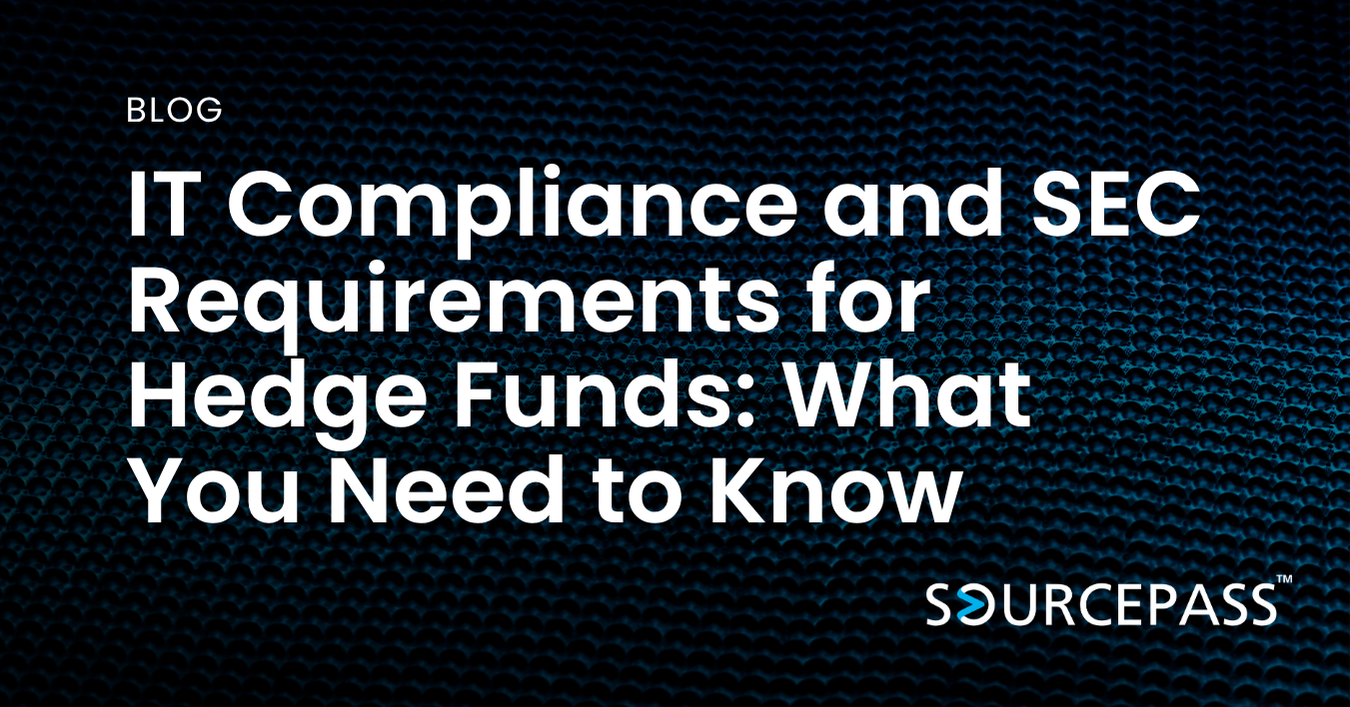IT Compliance and SEC Requirements for Hedge Funds: What You Need to Know
Jun 03, 2025 Admin Industry - Financial Sector & Private Equity | Security & Compliance | Governance, Risk & Compliance 3 min read



Hedge funds must do more than deliver returns—they must also meet strict compliance standards. With growing scrutiny from the Securities and Exchange Commission (SEC), the need for robust IT governance, data security, and operational transparency has never been greater.
This article breaks down the essentials of hedge fund IT compliance, explores key SEC tech regulations, and outlines how strong cybersecurity for hedge funds is critical to both compliance and performance.
Why IT Compliance Matters to Hedge Funds
For hedge funds, compliance is no longer confined to legal and financial departments. Information technology plays a central role in regulatory audits, data protection, investor confidence, and risk management.
Increased use of cloud services, mobile access, and electronic trading platforms means IT systems are now a core focus during SEC inspections and cybersecurity reviews.
Failing to meet compliance standards can result in hefty fines, reputational damage, investor loss, and in some cases, forced fund closure.
Key SEC Tech Regulations Impacting Hedge Funds
The SEC has significantly increased its focus on technology and cybersecurity in recent years. The following regulations and guidance documents impact hedge fund IT operations:
- Regulation S-P (Privacy of Consumer Financial Information)
Requires firms to protect client information and implement administrative, technical, and physical safeguards.
- Regulation S-ID (Identity Theft Red Flags Rule)
Mandates that hedge funds establish identity theft prevention programs, especially if they offer credit or manage customer accounts.
- Books and Records Rule (Rule 204-2)
Funds must retain and protect electronic communications, trading records, and compliance documentation for specified periods.
- SEC Cybersecurity Guidance
The SEC has issued guidance stating that registrants must disclose cybersecurity risks and incidents. Firms are also expected to have internal controls and a tested incident response plan.
- Proposed Cybersecurity Risk Management Rules (2023)
While still evolving, these rules aim to formalize cybersecurity governance, periodic risk assessments, and breach disclosures for registered investment advisers and funds.
Core Elements of Hedge Fund IT Compliance
To meet SEC expectations and reduce exposure, hedge funds should build an IT compliance framework that includes the following:
- Information Security Policies
Documented and enforced policies covering access control, data encryption, device usage, third-party risk, and more. These should be updated regularly to reflect changing threats and regulations.
- Secure Data Storage and Access Controls
Client data must be stored in secure environments with appropriate segmentation and multi-factor authentication. Access should follow least-privilege principles.
- Audit Logging and Monitoring
All critical systems should generate logs for access, changes, and security events. Logs should be reviewed regularly and stored in accordance with SEC retention requirements.
- Vendor Due Diligence
Third-party providers—especially cloud platforms, trading systems, and data services—must be evaluated for their own compliance and cybersecurity controls.
- Incident Response Plan (IRP)
An IRP outlines how your firm will detect, respond to, and recover from cybersecurity events. The SEC expects it to be detailed, rehearsed, and updated.
- Business Continuity and Disaster Recovery (BC/DR)
Your firm must be able to continue operations during a technology failure or cyberattack. A documented BC/DR plan is critical for both compliance and investor assurance.
Cybersecurity: The Cornerstone of Compliance
Cybersecurity for hedge funds is not just a technical requirement—it’s a regulatory mandate. SEC examiners routinely assess whether your firm:
- Encrypts data at rest and in transit
- Uses endpoint protection and threat detection
- Secures mobile access and remote work capabilities
- Has implemented phishing and cybersecurity awareness training
- Regularly tests systems with vulnerability assessments or penetration tests
Without these controls, your firm could be deemed non-compliant—even if no incident has occurred.
Tips for Maintaining IT Compliance
- Perform Regular Risk Assessments: At least annually, conduct a comprehensive IT and cybersecurity risk assessment and document the results.
- Train Staff on IT Compliance: Everyone in your organization should understand how their actions impact compliance and security.
- Document Everything: From policies to incident response tests, detailed documentation helps prove compliance during SEC audits.
- Work with a Specialized IT Partner: A managed IT provider with financial industry expertise can help navigate both technical and regulatory challenges.
- Stay Informed: Regulatory requirements evolve. Monitor updates from the SEC and adjust your IT strategy accordingly.
Conclusion
Hedge fund IT compliance is no longer optional or solely the domain of legal teams. In today’s regulatory climate, the SEC expects fund managers to take cybersecurity seriously and invest in the tools, policies, and oversight required to protect sensitive data.
Whether your firm is launching its first fund or managing billions in assets, now is the time to evaluate your cybersecurity posture and compliance readiness. A strong IT foundation doesn’t just reduce risk—it builds trust with regulators, investors, and partners.
Need help navigating SEC tech regulations?
We specialize in IT compliance and cybersecurity services for hedge funds and financial firms. Contact us today to schedule a compliance readiness assessment.
Subscribe To
Sourcepass Insights
Sourcepass Insights
Stay in the loop and never miss out on the latest updates by subscribing to our newsletter today!


